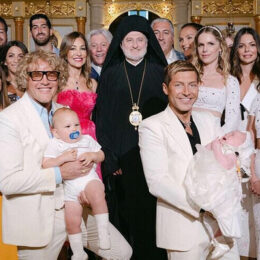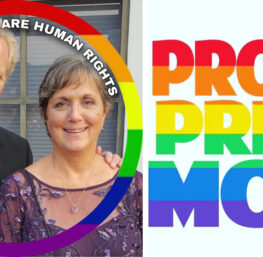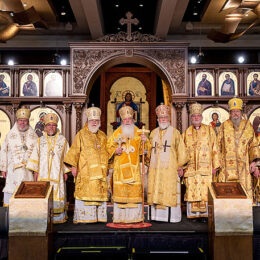9/25/2010 – National Review Editors –
If it is true, as we are constantly told, that American law will soon redefine marriage to accommodate same-sex partnerships, the proximate cause for this development will not be that public opinion favors it, although it appears to be moving in that direction. It will be that the most influential Americans, particularly those in law and the media, have been coming increasingly to regard opposition to same-sex marriage as irrational at best and bigoted at worst. They therefore dismiss expressions of that opposition, even when voiced by a majority in a progressive state, as illegitimate. Judges who believe that same-sex marriage is obviously just and right can easily find ways to read their views into constitutions, to the applause of the like-minded.
The emerging elite consensus in favor of same-sex marriage has an element of self-delusion about it. It denies that same-sex marriage would work a radical change in American law or society, insisting to the contrary that within a few years of its triumph everyone will wonder what all the fuss was about. But its simultaneous insistence that opponents are the moral equivalent of the white supremacists of yesteryear belies these bland assurances. Our tolerance for racism is quite limited: The government, while it generally respects the relevant constitutional limits, is active in the cause of marginalizing racists and eradicating racist beliefs and behaviors. Moreover, social sanctions against racism, both overt and implied, are robust. If our society is truly to regard opposition to same-sex marriage as equivalent to racism, it will have to undergo change both dramatic and extensive. Churches that object, for example, will have to be put in the same cultural position as Bob Jones University was in the days when it banned interracial dating, until they too join the consensus.
If proponents of same-sex marriage thought through these implications, their confidence might evaporate, for it seems highly unlikely that this project will succeed at all, and impossible that it will do so without decades of arduous and divisive social “reform.” That is no reason to shrink from the task, if it is truly a just one. But we should first consider whether the historic and cross-cultural understanding of marriage as the union of a man and a woman really has so little to be said for it.
We think that there is quite a bit to be said for it: that it is true, vitally true. But it is a truth so long accepted that it is no longer well understood. Both the fact that we are debating same-sex marriage and the way that debate has progressed suggest that many of us have lost sight of why marriage exists in the first place as a social institution and a matter of public policy. One prominent supporter of same-sex marriage says that the purpose of marriage is to express and safeguard an emotional union of adults; another says that its purpose is to make it more likely that people will have others to give them care in sickness and old age.
So at the risk of awkwardness, we must talk about the facts of life. It is true that marriage is, in part, an emotional union, and it is also true that spouses often take care of each other and thereby reduce the caregiving burden on other people. But neither of these truths is the fundamental reason for marriage. The reason marriage exists is that the sexual intercourse of men and women regularly produces children. If it did not produce children, neither society nor the government would have much reason, let alone a valid reason, to regulate people’s emotional unions. (The government does not regulate non-marital friendships, no matter how intense they are.) If mutual caregiving were the purpose of marriage, there would be no reason to exclude adult incestuous unions from marriage. What the institution and policy of marriage aims to regulate is sex, not love or commitment. These days, marriage regulates sex (to the extent it does regulate it) in a wholly non-coercive manner, sex outside of marriage no longer being a crime.
Marriage exists, in other words, to solve a problem that arises from sex between men and women but not from sex between partners of the same gender: what to do about its generativity. It has always been the union of a man and a woman (even in polygamous marriages in which a spouse has a marriage with each of two or more persons of the opposite sex) for the same reason that there are two sexes: It takes one of each type in our species to perform the act that produces children. That does not mean that marriage is worthwhile only insofar as it yields children. (The law has never taken that view.) But the institution is oriented toward child-rearing. (The law has taken exactly that view.) What a healthy marriage culture does is encourage adults to arrange their lives so that as many children as possible are raised and nurtured by their biological parents in a common household.
That is also what a sound law of marriage does. Although it is still a radical position without much purchase in public opinion, one increasingly hears the opinion that government should get out of the marriage business: Let individuals make whatever contracts they want, and receive the blessing of whatever church agrees to give it, but confine the government’s role to enforcing contracts. This policy is not so much unwise as it is impossible. The government cannot simply declare itself uninterested in the welfare of children. Nor can it leave it to prearranged contract to determine who will have responsibility for raising children. (It’s not as though people can be expected to work out potential custody arrangements every time they have sex; and any such contracts would look disturbingly like provisions for ownership of a commodity.)
When a marriage involving children breaks down, or a marriage culture weakens, government has to get more involved, not less. Courts may well end up deciding on which days of the month each parent will see a child. We have already gone some distance in separating marriage and state, in a sense: The law no longer ties rights and responsibilities over children to marriage, does little to support a marriage culture, and in some ways subsidizes non-marriage. In consequence government must involve itself more directly in caring for children than it did under the old marriage regime — with worse results.
Thoughtful proponents of same-sex marriage raise three objections to this conception of marriage. The first is that law and society have always let infertile couples marry; why not treat same-sex couples the same way? The question can be tackled philosophically or practically. The philosophical answer boils down to the observation that it is mating that gives marriage its orientation toward children. An infertile couple can mate even if it cannot procreate. Two men or two women literally cannot mate. To put it another way: A child fulfills the marital relationship by revealing what it is, a complete union, including a biological union. A man and a woman who unite biologically may or may not have children depending on factors beyond their control; a same-sex couple cannot thus unite.
The practical problems with using fertility as a criterion for marriage should be obvious. Some couples that believe themselves to be infertile (or even intend not to have children) end up having children. Government could not filter out those marriage applicants who are certain not to be able to have children without extreme intrusiveness. Note that we do not generally expect the eligibility criteria and purposes of marriage to exhibit a rigorous fitness in other respects. This is true about those aspects of marriage about which proponents and opponents of same-sex marriage alike agree. Nobody believes that people should have to persuade the government that they really are capable of a deep emotional union or that they are likely to stick around to take care of an ill partner before getting legally married, because that would be absurd. Nobody would try to devise a test to bar couples with no intention of practicing sexual exclusivity from getting married. It does not follow that marriage is therefore pointless or has nothing to do with monogamy, emotional union, or caregiving. (Those are indeed goods that marriage advances; but if sex did not make children, they would not be a reason to have the institution of marriage.)
The second objection proponents of same-sex marriage raise is that the idea that marriage is importantly linked to procreation is outdated. In our law and culture, the ties between sex, marriage, and child-rearing have been getting weaker thanks to contraception, divorce and remarriage, artificial reproduction, and the rise of single motherhood. Yet those ties still exist. Pregnancy still prompts some couples to get married. People are more likely to ask nosy questions about whether and when children are coming to couples that have gotten married. And we have not at all outgrown the need to channel adult sexual behavior in ways conducive to the well-being of children: The rising percentage of children who are not being raised by their parents, and the negative outcomes associated with this trend, suggest that this need is as urgent as ever. Our culture already lays too much stress on marriage as an emotional union of adults and too little on it as the right environment for children. Same-sex marriage would not only sever the tie between marriage and procreation; it would, at least in our present cultural circumstances, place the law behind the proposition that believing that tie should exist is bigoted.
The third objection is that it is unfair to same-sex couples to tie marriage to procreation, as the traditional conception of marriage does. Harm, if any, to the feelings of same-sex couples is unintentional: Marriage, and its tie to procreation, did not arise as a way of slighting them. (In the tradition we are defending, the conviction that marriage is the union of a man and a woman is logically prior to any judgment about the morality of homosexual relationships.)
And does marriage really need to be redefined? The legal “benefits” of marriage — such as the right to pay extra taxes, and to go through a legal process to sever the relationship? — are overstated. Almost all the benefits that the law still grants could easily be extended to unmarried couples, including same-sex couples, without redefining marriage. The campaign for same-sex marriage is primarily motivated by one specific benefit: the symbolic statement by the government that committed same-sex relationships are equivalent to marriages. But with respect to the purposes of marriages, they’re not equivalent; and so this psychic benefit cannot be granted without telling a lie about what marriage is and why a society and legal system should recognize and support it.
Same-sex marriage is often likened to interracial marriage, which the law once proscribed. But the reason governments refused to recognize (and even criminalized) interracial marriages was not that they did not believe that such marriages were possible; it is that they wanted to discourage them from happening, in the interests of white supremacy. Sexual complementarity is a legitimate condition of marriage because of the institution’s orientation toward children; racial homogeneity has nothing to do with that orientation. Laws against interracial marriage thus violated the right to form an actual marriage in a way that laws defining marriage as the union of a man and a woman do not violate it. The argument about what the equal rights of all citizens entail for marriage laws turns, in other words, on what marriage is. If marriage just is by its nature oriented toward procreation, the refusal to redefine it to accommodate same-sex partners unjustly discriminates against them no more than the military does against the flat-footed.
Same-sex marriage would introduce a new, less justifiable distinction into the law. This new version of marriage would exclude pairs of people who qualify for it in every way except for their lack of a sexual relationship. Elderly brothers who take care of each other; two friends who share a house and bills and even help raise a child after one loses a spouse: Why shouldn’t their relationships, too, be recognized by the government? The traditional conception of marriage holds that however valuable those relationships may be, the fact that they are not oriented toward procreation makes them non-marital. (Note that this is true even if those relationships involve caring for children: We do not treat a grandmother and widowed daughter raising a child together as married because their relationship is not part of an institution oriented toward procreation.) On what possible basis can the revisionists’ conception of marriage justify discriminating against couples simply because they do not have sex?
How, for that matter, can it justify discriminating against groups of more than two involved in overlapping sexual relationships? The argument that same-sex marriage cannot be justified without also, in principle, justifying polygamy and polyamory infuriates many advocates of the former. There is, however, no good answer to the charge; and the arguments and especially the rhetoric of same-sex marriage proponents clearly apply with equal force to polygamy and polyamory. How does it affect your marriage if two women decide to wed? goes the question from same-sex marriage advocates; you don’t have to enter a same-sex union yourself. They might just as accurately be told that they would still be free to have two-person marriages if other people wed in groups.
We cannot say with any confidence that legal recognition of same-sex marriage would cause infidelity or illegitimacy to increase; we can say that it would make the countervailing norms, and the public policy of marriage itself, incoherent. The symbolic message of inclusion for same-sex couples — in an institution that makes no sense for them — would be coupled with another message: that marriage is about the desires of adults rather than the interests of children.
It may be that the conventional wisdom is correct, and legal recognition of same-sex marriage really is our inevitable future. Perhaps it will even become an unquestioned policy and all who resisted it will be universally seen as bigots. We doubt it, but cannot exclude the possibility. If our understanding of marriage changes in this way, so much the worse for the future.
HT: National Review




I doubt that same-sex marriage will ever be legalized in American society. As a predominantly Christian nation, America will continue to abide by the Bible’s definition of marriage — a union between one man and one woman.